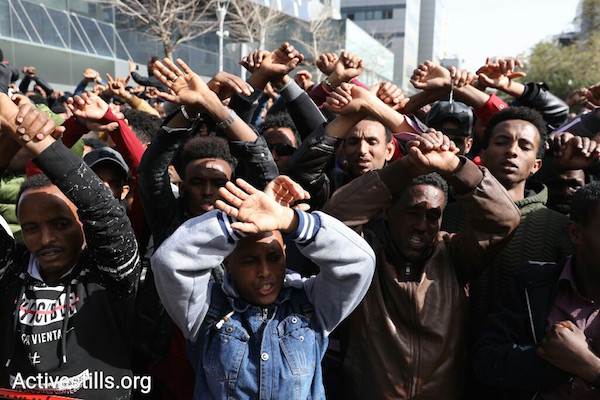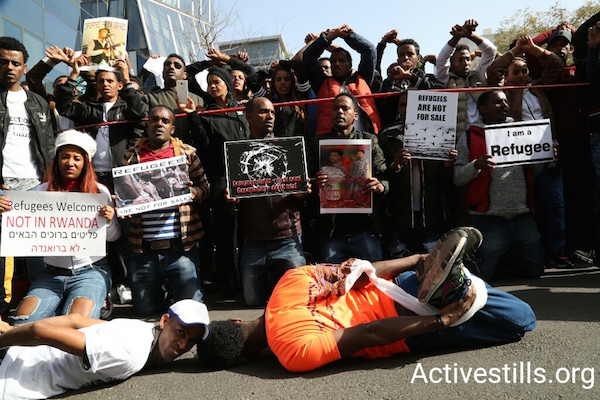The demonstration, held by African asylum seekers, Israelis, and international activists, marks the opening of a new front in the struggle against the deportation.

Approximately 2,000 asylum seekers demonstrated outside of the Rwandan embassy in Herzilya on Monday against the Israeli government’s plan to deport them. The demonstrators, joined by Israeli and international human rights activists, chanted “We are Eritrean, we are not Rwandan” and “refugees are not for sale.”
“Israel must check our asylum requests and provide us protection,” the organizers of the protest said. “We are demanding that the Rwandan embassy oppose any agreements with Israel.” The protest organizers also called on Israelis to join them in resisting the deportations.
The Israeli government approved the deportation of asylum seekers, most of them from Eritrea and Sudan, to third countries, including Rwanda and Uganda, in December of last year. According to the government’s plan, the asylum seekers will face a “choice”: deportation or indefinite imprisonment.
The government claims to have agreements with Rwanda and Uganda, under which Israel will pay those countries $5,000 for each refugee they take in from Israel. Israel will also pay $3,500 to each asylum seeker who agrees to leave, though beginning in April, that sum will gradually decrease to incentivize the asylum seekers to leave. As recently as early January, however, the governments of Rwanda and Uganda denied reaching a deal with Israel.
Attorney Asaf Weitzen, formerly of the Hotline for Refugees and Migrants, said earlier this month that public pressure on the Rwandan government could be key to fighting the deportations. “There’s a reason Rwanda is keeping this a secret, why they won’t talk about in public,” Weitzan said, adding that activist efforts should focus on protesting in front of Rwanda embassies around the world and flooding them with emails and faxes.

As my colleague Yael Marom writes, the agreements between Israel and Rwanda and Uganda are not new. For years, Israel has paid asylum seekers to leave to those two countries. And while the Israeli government insists that the asylum seekers who leave will not be in danger, the testimonies of hundreds of asylum seekers who left paint a very grim picture of what awaits them upon their departure: torture, rape, mass and arbitrary imprisonment, forced labor. They are often denied status and prohibited from working. When attorney Anat Ben Dor of Tel Aviv University’s Refugee Rights Clinic visited Uganda, she found asylum seekers held “in cells with 30 people, no light, no water no beds.” She added, “in Israel, you wouldn’t keep animals in conditions like these.”
Monim Haroon, an asylum seeker activist, said that he believed people would choose prison in Israel over deportation to Rwanda or Uganda. “The government has done everything it can to make us feel unwanted here,” he told me last week. “But we have no choice,” he said, adding that he was certain the situation in Rwanda or Uganda “won’t be better than the situation right now.”

